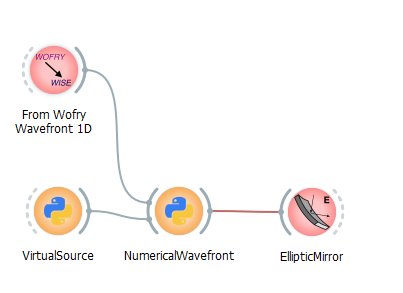CONCLUSION
I have two options: 1) Attach an "offset" parameter to the numerical source 2) Follow the pattern of "VirtualSource" + "WavefrontSource", where I use the "VirtualSource" to set the reference and the "WavefrontSource" to provide photons
Comments on 1) The distance b.w. optical element MUST not change The distance from the source should be added "offset"
This introduces a weird behavior: GetDistanceFromParent and GetDistanceFromSource could return different values.
Changing this can be very painful, but more compact in the end.
Comments on 2) The concept of "source" within the beamline is ill-posed. The geometry would be set by the VirtualSource (distances etc), but the wavelength and direction of propagation would be set in "WavefrontSource".
The problem could be circumvented, in principle, by replacing the attribute Beamline.Sourcewith the two more specific Beamline.SourceReference and Beamline.SourceWavefront, which coincide in normal cases.
Changing this should be easier, but ultimatelly requires the usage of 4 widgets instead of 2.
I am still wondering what the best solution is.











Personal Note
Problem: Considering the structure of LibWiser, I found difficult to introduce the "NumericalSource" object, which was supposed to be used in either of the two ways:
It would be easier to me (perhaps not to the user) something like that
WHY? The word "source" can refers to two things: 1) the "nominal source of a facility", where distances are taken from (source=origin) 2) the optical element that delivers photons (i.e. the complex array of the Field) to all the others. This is just a wavefront assigned to a certain longitudinal position of the transport.
What SRW delivers is 2). What WISER uses for positioning is 1).